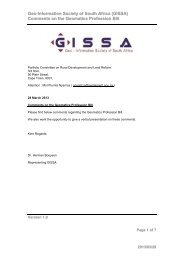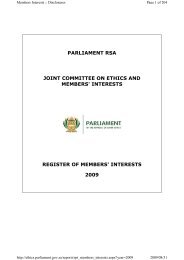An Easy Guide to Sex Work Law Reform - Parliamentary Monitoring ...
An Easy Guide to Sex Work Law Reform - Parliamentary Monitoring ...
An Easy Guide to Sex Work Law Reform - Parliamentary Monitoring ...
You also want an ePaper? Increase the reach of your titles
YUMPU automatically turns print PDFs into web optimized ePapers that Google loves.
Social services and health outreach report that the existence if the law has made it harder for them<br />
<strong>to</strong> maintain contact with sex workers.<br />
Impact of partial criminalisation on sex workers<br />
Research in Sweden (see references below)<br />
Ironically, partial criminalisation goes further than criminalisation <strong>to</strong> dehumanise and objectify sex<br />
workers by not recognising the seller of sex as an accessory <strong>to</strong> the crime of buying sex. She {the sex<br />
worker} just does not feature at all, with no basis on which <strong>to</strong> participate in the legal procedures<br />
regarding the crime; sex workers are denied legal recognition in the criminal process. The<br />
presumption that it is undesirable <strong>to</strong> criminalise the ”victim” of the crime – the sex worker – is<br />
further contradicted by supplementary legal provisions that clearly criminalise and marginalise sex<br />
workers through other means.<br />
The most significant direct impact of the law on sex workers, however, is the way in which the law<br />
pathologises sex workers. Pye Jakobsson, the international spokesperson for the Rose Alliance,<br />
states that “the message that the law is sending is that everybody is a victim and people are treated<br />
accordingly… The claim is that the law is <strong>to</strong> save sex workers, but in fact, the message of the law is<br />
pushing sex workers further away from society.” In terms of the way in which authorities and<br />
service providers treat sex workers, repeated testimonies indicate that most difficulties occur when<br />
sex workers refuse <strong>to</strong> comply with their imposed victim status. Where sex workers refuse <strong>to</strong> s<strong>to</strong>p<br />
their work, refuse <strong>to</strong> submit <strong>to</strong> being saved and decline <strong>to</strong> cry for help, service provision is often<br />
withheld, rights <strong>to</strong> have alleged rape or abuse reported or prosecuted frequently denied and<br />
parental rights, at times, removed. In other words, when sex workers insist on their own agency they<br />
are persecuted for it. With popular academic and media reports often grouping all sex work,<br />
including stripping, as “prostitution” and reporting strip clubs as “brothels”, sex workers in the broad<br />
sense, and women sex workers in particular, are disempowered and stigmatised. Should sex workers<br />
wish <strong>to</strong> leave the industry, this stigma makes entering the conventional job market particularly<br />
challenging.<br />
The view of sex work taken by the Swedish law is that there can be no such thing as voluntary<br />
prostitution. By emphasising structural subordination of the seller, the will and agency of the sex<br />
worker is regarded as irrelevant or non-existent. If her/his agency in the conduct of selling sex is<br />
acknowledged in individual instances, it is viewed as contrary <strong>to</strong> the perceived public good and is<br />
subordinated <strong>to</strong> it for this reason. The official view is thus that all sex workers are ‘victims’, sexual<br />
objects of patriarchal dominance. This notion of the irrelevance of seller’s consent is central <strong>to</strong> the<br />
laws structure and impact.<br />
The “shamefulness” of purchasing sex is most certainly projected on<strong>to</strong> the seller, exemplified in a<br />
statement by Detective Superintendent Jonas Trolle of the Swedish Police, who said, "It should be<br />
difficult <strong>to</strong> be a prostitute in our society - so even though we don't put prostitutes in jail, we make life<br />
difficult for them". (B) The paradoxical conceptions of sex workers as both victims and participants in<br />
the crime serves <strong>to</strong> marginalise, disempower and cast shame on sex workers.<br />
Impact of partial criminalisation on sex worker-police relationship<br />
14















